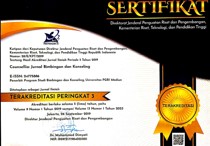Efektivitas Pendekatan Konseling Cognitive Behavior Therapy (CBT) Untuk Mereduksi Perilaku School Refusal Pada Peserta Didik
DOI:
https://doi.org/10.25273/counsellia.v13i1.15845Keywords:
school refusal, cognitive behavior therapy (CBT), self-management.Abstract
Penelitian dilakukan berdasarkan fenomena yang muncul pada peserta didik SMKN 1 Jatirejo, Mojokerto, yaitu dengan permasalahan perilaku school refusal. Tujuan pada penelitian ini agar mengetahui efektivitas pendekatan cognitive behavior therapy (CBT) untuk mereduksi perilaku school refusal. Rancangan penelitian yang dipai adalah kuantitatif dengan jenis penilitian single subject design (SSD) yaitu A-B-A’. Hasil analisis yang diperloleh pada analisis dalam kondisi dan antar kondisi yaitu menurun dengan hasil overlap -0,95%, dimana semakin rendah semakin baik. Hal ini juga diperkuat oleh hasil post-test pada akhir baseline-2 (A’) dengan skor 51 yang tergolong rendah. Setelah dilakukannya konseling individu teknik cognitive behavior therapy (CBT) dapat ditarik hasil bahwa dapat mengurangi perilaku school refusal.
Downloads
References
Adhiputra, A. . N. (n.d.). Teknik bimbingan konseling. 2007, 1–21.
Andani, N. A.-Z. P., & Nursalim, M. (2019). Penerapan Konseling Individu Teknik Self Management Terhadap School Refusal Peserta Didik Kelas X Sman 8 Surabaya. Paper Knowledge . Toward a Media History of Documents.
Cormier, W. H. dan C. L. . (1985). Interviewing Strategis For Helpers. Publishing Company.
Danuri, & Maisaroh, S. (2019). Metodologi penelitian.
Ghozali, I. (2009). Aplikasi Analisis Multivariate Dangan Program SPSS. (4th ed.). Semarang: Penerbit Universitas Diponegoro.
Gunarsa, D. S. (1996). Konseling dan Psikoterapi. BPK Gunung Mulia.
Handayani. (2005). Mempersiapkan dan Mengenalkan Sekolah Pada Anak. Prestasi Pustakaraya.
Hayati, M. L., & Darmito, E. (2019). Keefektifan penggunaan strategi pengelolaan diri dalam konseling kelompok untuk meningkatkan disiplin belajar peserta didik. Jurnal BK UNESA, 9, 53–65.
Kearney, C. A., Chapman, G., & Cook, L. C. (2005). School refusal behavior in young children. International Journal of Behavioral Consultation and Therapy, 1(3), 216–222. https://doi.org/10.1037/h0100746 DOI: https://doi.org/10.1037/h0100746
Khan, J. . (1981). Unwillingly To School. School Phobia or School Refusal: A Psyco-Sosial Problem. Pergamon Press; Edisi ke-3. DOI: https://doi.org/10.1016/B978-0-08-025229-2.50010-X
Komalasari, G., Wahyuni, E., & Karsih. (2011). Teori dan Teknik Konseling. PT. Indeks.
Lewis, J. A., Lewis, M. D., Daniels, J. A., & Andrea, M. J. . (2010). Community counseling: A multicultural-social justice perspective. Nelson Education.
Ligh, D. J. (1972). School Refusal. British Medical Journal, 3(5820), 236–237. https://doi.org/10.1136/bmj.3.5820.236-c DOI: https://doi.org/10.1136/bmj.3.5820.236-c
Manurung, N. (2012). School Refusal Pada Anak Sekolah Dasar. Jurnal Psikologi Undip, 11(1), 191–199.
Mash, E. ., & Wolfe, J. . (2005). Abnormal Child Psychology (3rd ed.). Thomson Wadsworth.
Matson, J. ., & Ollendick, T. . (1988). Enhancing Children’s social skills: Assessment and training. London: Pergamon press.
Sa’adah, F. M., & Rahman, I. K. (2015). Konsep Bimbingan Dan Konseling Cognitive Behavior Therapy (Cbt) Dengan Pendekatan Islam Untuk Meningkatkan Sikap Altruisme Siswa. Hisbah: Jurnal Bimbingan Konseling Dan Dakwah Islam, 12(2), 49–59. https://doi.org/10.14421/hisbah.2015.122-05 DOI: https://doi.org/10.14421/hisbah.2015.122-05
Shatte, A., & Reivich, K. (2002). The Resilience Factor Tujuh Key To Finding Your Inner Strength And Over_coming Life’s Hurdles. Three Rivers Press.
Sugiyono. (2018). Metode Penelitian Kuantitatif dan R&D. Bandung: Alfabeta.
Sunanto, J., Takeuchi, K., & Nakata, H. (2005). Pengantar Penelitian Dengan Subyek Tunggal.
Downloads
Published
Issue
Section
License
In order to be accepted and published by Counsellia: Jurnal Bimbingan dan Konseling, the author(s) submitting the article manuscript should complete all the review stages. By submitting the manuscript the author(s) agreed to the following terms:
The copyright of received articles shall be assigned to Counsellia: Jurnal Bimbingan dan Konseling. The intended copyright includes the right to publish articles in various forms (including reprints). Counsellia: Jurnal Bimbingan dan Konseling maintain the publishing rights to the published articles.
Authors are allowed to use their articles for any legal purposes deemed necessary without written permission from Counsellia: Jurnal Bimbingan dan Konseling with an acknowledgement of initial publication to this journal.
Author sent the copyright transfer form (here) to the journal.

This work is licensed under a Creative Commons Attribution-NonCommercial-ShareAlike 4.0 International License.






